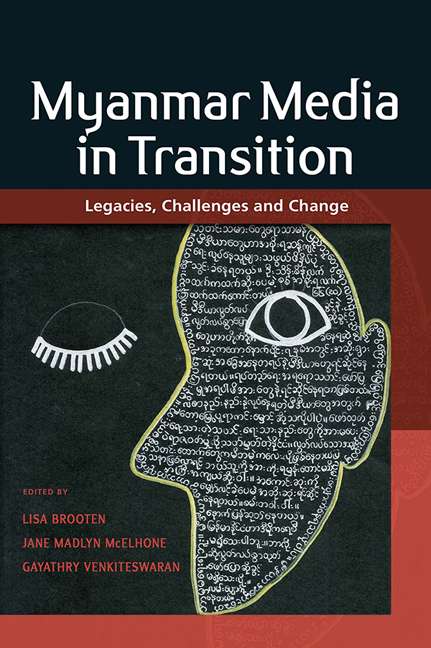Book contents
- Frontmatter
- Contents
- Contributors and Editors
- Burma or Myanmar? A Note on Terminology
- 1 Introduction: Myanmar Media Historically and the Challenges of Transition
- Part I Structural Constraints and Opportunities
- Part II Journalism in Transition
- 6 Silencing a Snakehead Fish: A Case Study in Local Media, Rural-Based Activism, and Defamation Litigation in outhern Myanmar
- 7 Precarity and Risk in Myanmar's Media: A Longitudinal Analysis of Natural Disaster Coverage by The Irrawaddy
- 8 Educating a New Generation of Watchdogs: Interview with Ye Naing Moe, Director of the Yangon and Mandalay Journalism Schools
- 9 The Metamorphosis of Media in Myanmar's Ethnic States
- 10 Covering Rakhine: Journalism, Conflict and Identity
- 11 Media in Myanmar: Laws, Military and the Public
- 12 Cracking The Glass Ceiling in Myanmar Media
- 13 Media and the 2015 General Elections
- Part III Creative Expression
- Part IV Society and Media
- Epilogue: Media Studies in Myanmar – Where Do We Go from Here?
- Index
13 - Media and the 2015 General Elections
from Part II - Journalism in Transition
Published online by Cambridge University Press: 07 September 2019
- Frontmatter
- Contents
- Contributors and Editors
- Burma or Myanmar? A Note on Terminology
- 1 Introduction: Myanmar Media Historically and the Challenges of Transition
- Part I Structural Constraints and Opportunities
- Part II Journalism in Transition
- 6 Silencing a Snakehead Fish: A Case Study in Local Media, Rural-Based Activism, and Defamation Litigation in outhern Myanmar
- 7 Precarity and Risk in Myanmar's Media: A Longitudinal Analysis of Natural Disaster Coverage by The Irrawaddy
- 8 Educating a New Generation of Watchdogs: Interview with Ye Naing Moe, Director of the Yangon and Mandalay Journalism Schools
- 9 The Metamorphosis of Media in Myanmar's Ethnic States
- 10 Covering Rakhine: Journalism, Conflict and Identity
- 11 Media in Myanmar: Laws, Military and the Public
- 12 Cracking The Glass Ceiling in Myanmar Media
- 13 Media and the 2015 General Elections
- Part III Creative Expression
- Part IV Society and Media
- Epilogue: Media Studies in Myanmar – Where Do We Go from Here?
- Index
Summary
In this chapter, I explore the challenges and opportunities that the 8 November 2015 national parliamentary elections presented for the Myanmar media, and their difficult relations with the Union Election Commission (UEC). A critical benchmark for the country's democratic transition, the elections marked the first time in more than half a century that a Myanmar government had been democratically elected and was able to take office. The quasi-civilian government headed by President Thein Sein acknowledged the defeat of the army-backed party, the Union Solidarity and Development Party (USDP), and the civilian party led by Aung San Suu Kyi, the National League for Democracy (NLD), assumed power.
The findings in this chapter stem from field observations, interviews and print sources in Myanmar and English languages collected between 2014 and 2016. I observed these processes from within the UEC, where I worked as a senior technical advisor for international organizations supporting the electoral processes. I was personally involved in negotiations related to media access and journalists’ accreditation.
The first section of the chapter provides a brief overview of the legal framework that defines the concept of media space, with a specific focus on election day. Regulations included constraints on journalists’ ability to cover the elections, which affected their access to polling stations. The second section presents two very different — and often diametrically opposed — views held by the UEC leadership and private media representatives. The root causes of the deeply entrenched mistrust that I observed will be placed in the context of recent private media expansion in the country following the lifting of pre-publication censorship. This includes very different institutional cultures, fundamental disagreements about the role of private media, and diverging political preferences. As a result of the mistrust, there were numerous missed opportunities that could have improved communication among key stakeholders and, in turn, increased awareness about the voting process among the general public. That being said, on election day, media played a fundamental role in legitimizing the vote and enabling a wider acceptance of the results.
Media During the Pre-election Period
The people in Myanmar had previously witnessed their electoral choices being ignored by the military government (after the 1990 elections) or affected by systematic fraud (during the 2008 referendum and 2010 elections). This political history triggered a number of challenges for media covering the 2015 elections.
- Type
- Chapter
- Information
- Myanmar Media in TransitionLegacies, Challenges and Change, pp. 251 - 264Publisher: ISEAS–Yusof Ishak InstitutePrint publication year: 2019

